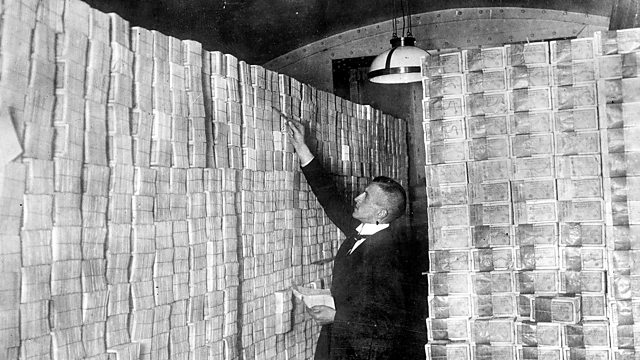The Great Inflation
1923 was the year of hyperinflation in Germany. Allan Little examines how the trauma which followed has shaped the economy and politics of Germany and beyond for 100 years.
A hundred years ago, Germany was in the grip of the worst hyperinflation the world has ever seen. Nothing before or since has matched the speed and precipitous fall of the Reichsmark.
It lost 99.9% of its post-war value in 1923, and this unimaginable loss of confidence in the currency left the German government and population reeling.
We’re all familiar with the famous photographs of wheelbarrows full of cash to pay for one bus ticket, children playing with wads of notes as building blocks, families pasting trillion-mark banknotes onto their walls, more useful now as wallpaper than money. But what was it really like to live through that year of horror? Lenin reputedly said that ‘if you want to corrupt a country you must start by corrupting its currency’.
The consequences of 1923 were not just misery, suffering and starvation but also a moral degeneration - the excesses of the tail-end of the Weimer Republic and the political catastrophe which followed.
Allan Little goes to Germany to investigate the causes and consequences of hyperinflation. Who were the losers? Who were the winners – making fortunes out of the total collapse of the country? Allan examines how the collective memory of this traumatic experience in 1923 has shaped German fiscal, economic and social policy ever since.
The deutschmark became the symbol of stability, pride and confidence for a nation who couldn’t celebrate its war heroes or recent history. How have generations of German policy makers, with their abhorrence of debt and stringent adherence to sound money, influenced European Union fiscal and social policy?
The lingering effects of that cataclysmic year, a century ago, can still be felt in German society today.
A Just Radio production for 91�ȱ� Radio 4
Last on
Broadcasts
- Wed 15 Mar 2023 11:0091�ȱ� Radio 4
- Mon 20 Mar 2023 20:0091�ȱ� Radio 4

